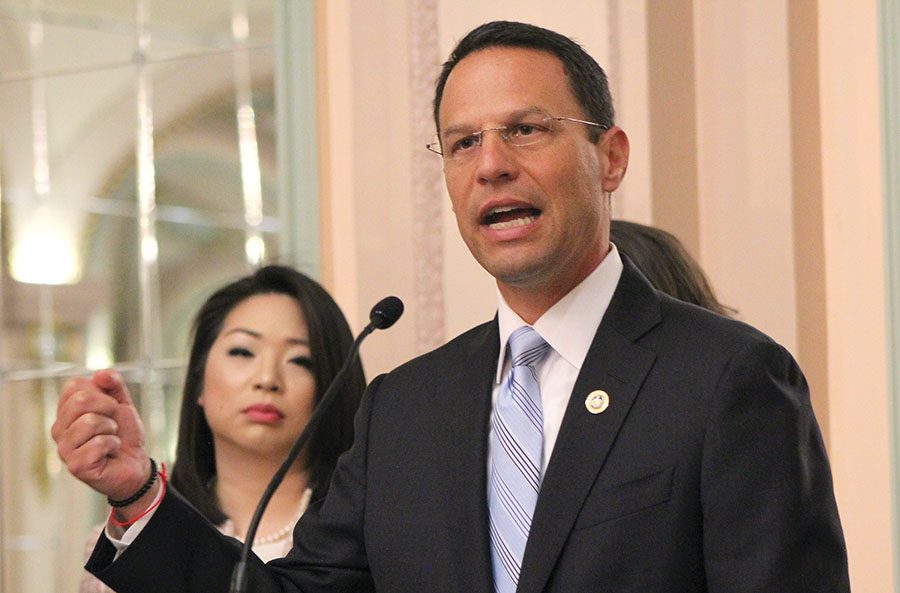Pennsylvania attorney general issues report on campus safety
Photo by Mick Stinelli
Pennsylvania Attorney General Josh Shapiro holds a press conference at the William Pitt Union discussing his new campus safety report. The press conference came hours before a New York Times story detailing Title IX rollbacks by Secretary of Education Betsy DeVos.
September 4, 2018
State Attorney General Josh Shapiro visited the University of Pittsburgh last week to release a report on campus safety.
The report features recommendations to Pennsylvania colleges and universities on how to act on students’ mental health, drug and alcohol abuse and sexual assault.
“We want students to be safe, and we want parents not to have to worry,” Shapiro said at the press conference.
The 35-page report features recommendations to be made at the structural level, implementations to be made before students arrive on campus, talking points at orientation, ongoing conversations to have throughout the school year and ways that universities can work with their surrounding
communities.
Elizabeth Rosemeyer, Title IX coordinator at Point Park, sat in on the attorney general office’s listening tours.
“We were giving the message that, as universities, we didn’t want to take steps backward,” Rosemeyer said.
She emphasized that if universities are given complete discretion in Title IX matters, they can choose to have as little as one prevention program a year.
“We did not see this as a place where we wanted to make less focus,” she said.
Shapiro said that what he saw most was that universities wanted to help their students as much as possible.
“To varying degrees, all universities want to do the right thing,” he said. “What I did not get was hostility from the universities,” he said.
Shapiro painted this in stark contrast to ten years ago. “There was a lot of hiding from reality on campus. I don’t get that anymore on general terms.”
Though Shapiro said that the focus was on “all campuses across the commonwealth,” the report features a number of “global recommendations” which could be applied to universities across the world.
Shapiro also discussed that changes must be made within the minds of students.
“We have got to remove the stigma of these issues,” he said, referring the issues of substance abuse, mental health, and sexual assault outlined in the report. He also stated that there is a need to encourage students to call for help when they need it.
The report calls for offering trauma-informed staff, improved Title IX policies and training student leaders on mental health awareness, among other things.
The report was sharply juxtaposed hours later when it was revealed Education Secretary Betsy DeVos was planning new sexual misconduct policies on U.S. campuses.
As detailed by the New York Times, the proposed rules “narrow the definition of sexual harassment” for colleges and universities.
Hours before the report by the Times, Shapiro criticized DeVos’s stance on campus sexual assault.
“The idea that Secretary Betsy DeVos would want to roll back those Title IX regulations does not sit well with me,” Shapiro said at the press conference. He praised strides made by the Obama administration and said that Pennsylvania had a responsibility to protect Title IX provisions.
“It certainly is not perfect, but the idea is not to throw it all away,” he said. “Her actions threaten to make college campuses less safe, not more safe.”
He also said that he has previously corresponded with DeVos and has discussed taking legal action against her department.
Rosemeyer said that the university would continue taking steps to preserve the sexual assault provisions Title IX on campus.

















Peg Pennepacker • Sep 5, 2018 at 10:18 am
I respectfully suggest that Attorney General Shapiro turn his efforts towards K-12 schools where the behavior begins. Only by changing the ‘culture’ at the K-12 level will we make progress regarding these issues. Thank you for making a difference.